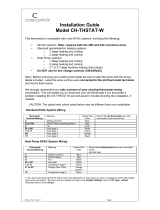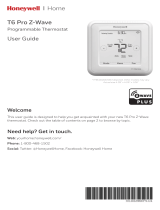
10
Wire specification (RS1 & RS2): 2 conductors, 18 gauge wire. Make sure that the sensor wires have a cable separate from the thermostat
cable. Best results for distances of 100 feet or less. Accuracy may be affected for distances up to a maximum of 200 feet. Shielded cable is
recommended for distances over 100 feet and less than 200 feet.
CAUTION: Keep this wiring at least one foot away from large inductive loads such as electronic air cleaners, motors,
line starters, lightning ballasts, and large distribution panels. Failure to follow these wiring practices may introduce electrical
interference (noise) which can cause erratic system operation. Shielded cable is required if the above wiring guidelines cannot be
met. Be sure to ground only one end of the shield to the thermostat common terminal. Tape back the other end of the shield.
Remote Sensors Part Numbers
Remote Indoor Sensor: Use ZZSENSAL0400AA for indoor applications.
Remote Outdoor Sensor: Use BAYSEN01ATEMPA for outdoor applications.
ÎÎ IMPORTANT: Make sure that the sensor wires have a cable separate from the thermostat cable.
ÎÎ IMPORTANT: Follow directions below for averaging. These instructions replace the averaging information found in the Installer’s
Guide for the ZZSENSAL0400AA.
ÎÎ Note: Remote Sensor 2 can be selected as an indoor sensor or an outdoor sensor.
Remote Temperature Sensor Connections and Operation:
A) Indoor sensor connected to RS1. Replaces internal sensor. RS2 not connected.
Remote Sensor 1 (RS1) replaces the internal
temperature sensor of the thermostat. This allows the
thermostat to be installed in a location different than
the area where the temperature will be measured. Use
ZZSENSAL0400AA. See Figure A.
B) Indoor sensor connected to RS2. Averages
temperature with internal sensor. RS1 not
connected.
RS2 is used as an indoor temperature sensor that
averages temperatures with the internal sensor. Use
ZZSENSAL0400AA. See Figure B.
If RS2 is set to indoor location (“IN” - Default selection in
the thermostat installation set up menu) and a sensor is
attached to the RS2 sensor terminals of the thermostat,
the RS2 temperature is averaged with the thermostats
internal temperature sensor.
C) Indoor sensors connected to RS1 and RS2.
Averages RS1 and RS2 sensor temperatures.
Internal sensor is not used.
Remote Sensor 1 (RS1) and Remote Sensor 2 (RS2)
are both used as indoor sensors. The RS1 temperature
and RS2 temperature is averaged. See Figure C.
D) Outdoor sensor connected to RS2. Reports
outdoor temperature to comfort control.
RS2 is used as an outdoor temperature sensor. Use
BAYSEN01ATEMPA. See Figure B.
If RS2 is set to outdoor location (“OUT” in the thermostat installation set up menu) and a sensor is attached to the RS2 sensor terminals
of the thermostat, the RS2 temperature is used to report outdoor temperature. It is also displayed on the thermostat main screen. See
Step 19 to configure for outdoor temperature sensing.
E) Indoor sensor connected to RS1 and Outdoor sensor connected to RS2. RS1 replaces the internal sensor. RS2 reads the
outdoor temperature.
Remote Sensor 1 (RS1) replaces the internal temperature sensor of the thermostat. This allows the thermostat to be installed in a
location different than the area where the temperature will be measured. Use ZZSENSAL0400AA.
RS2 is used as an outdoor temperature sensor. Use BAYSEN01ATEMPA. See Figure C.
If RS2 is set to outdoor location (“OUT” in the thermostat installation set up menu) and a sensor is attached to the RS2 sensor terminals
of the thermostat, the RS2 temperature is used to report outdoor temperature. It is also displayed on the thermostat main screen. See
Step 19 to configure for outdoor temperature sensing.
RS1 Sensor
Remote Temp Sensor
Figure A
Sensor wiring is
not polarized.
Black
Red
RS1
RS1
RS2
RS2
Sensor wiring is
not polarized.
Black
Red
Figure B
RS1
RS1
RS2
RS2
RS2 Sensor
Figure C
RS1 Sensor
Remote Temp Sensor
Black
Red
RS1
RS1
RS2
RS2
RS2
Sensor wiring is
not polarized.
Black
Red
Optional Remote Temperature Sensors Installation - TZEMT500 Only























